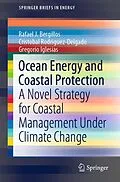This book presents the innovative concept of the dual function of wave farms as both renewable energy generators and coastal protection elements against erosion and flooding.
Developing renewable energy is one of the most pressing targets for society in the coming decades due to the finite nature of fossil fuels, their high costs, and the environmental impacts of their exploration and use, including climate change and the subsequent sea-level rise. Wave energy is one of the most promising renewable energy sources, thanks to its huge potential and low impact on the environment. As such, this book discusses the development and application of artificial intelligence to optimise wave farm location and layout, assesses the influence of the wave energy converter geometry on coastal protection against erosion and flooding, and analyses how the performance of wave farms as coastal defence elements is affected by climate change and sea level rise. The concepts, methods and conclusions presented are helpful to students, researchers, academics, engineers, designers, stakeholders and managers around the globe interested in wave energy, coastal engineering, and coastal management.Autorentext
Rafael J. Bergillos is a postdoctoral researcher at the University of Córdoba (Spain). He has a M.Eng. in Civil Engineering (2011), an M.Sc. in Management of Ports and Coastal Zones (2013), an M.Sc. in Management of River Basins (2014), and a Ph.D. in Environmental Hydraulics (2017). His main research interests include is the study of the dynamics of coastal areas, covering theoretical fundamentals, analysis of experimental observations, numerical modelling applications, and proposal of management recommendations. He has published more than 20 papers in respected journals and contributed to over 25 prestigious national and international conferences. He has been a visiting researcher at leading international institutions in the field of coastal engineering and is currently involved in several national and international R+D projects. He has reviewed papers submitted to more than 15 journals listed in Journal Citation Reports.
Cristobal Rodriguez-Delgado is a Maritime Engineer at PROES Consultores (Spain). He holds an M.Eng. in Civil Engineering (2015) and an M.Sc. in Environmental Hydraulics (2016), both from the University of Granada. He obtained his Ph.D. from the University of Plymouth in 2019. His main research interest is the study of the wave farm effects on the shoreline evolution through the joint application of wave propagation models, longshore sediment transport formulations, and the one-line model. He has published more than 10 journal papers and contributed to several national and international conferences. He has also been involved in several national and international R+D projects.
Inhalt
Introduction.- Optimization of Wave Farm Location and Layout for Coastal Protection.- Wave Energy Converter Geometry for Coastal Erosion Mitigation.- Wave Energy Converter for Coastal Flooding Mitigation.- Management of Coastal Erosion Under Climate Change Through Wave Farms.- Management of Coastal Flooding Under Climate Change Through Wave Farms.
